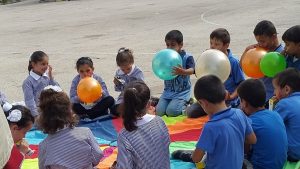Courtesy of the Ministry of Education
and Higher Education
In Palestine, education is the key investment pillar on which the nation can be built and the well-being of its citizens achieved. Ever since the Palestinian Ministry of Education and Higher Education (MoEHE) took over the education sector in 1994, it has given great attention to staff capacity building, offering training in accordance with modern trends in education, and the rehabilitation and expansion of school infrastructure in order to keep up with the challenges of development and population growth and accommodate the steady increase in the number of students.
The challenges that MoEHE faces are enormous, and the situation is far from ideal, but the Palestinian nation is steadfast in its resilience, and the Palestinian government is doing its best to improve conditions and attain better outcomes. In this article, we choose to highlight enormous efforts undertaken by MoEHE and the teachers and staff at our schools and underscore the successes that they and their students can take pride in.
With all its endeavors, the MoEHE takes great care to make effective use of the available resources and build upon existing knowledge, which is reflected in the high quality of the implemented programs that are by and large characterized by professionalism, modernity, novelty, and excellence and a direct reflection of MoEHE’s policies towards education. Among the main assets of the ministry are its teachers, some of whom we are proud to introduce here.
Hanan Alhroub, who ranked first in the Varkey Foundation’s Global Teacher Prize in 2016, confesses that her decision to specialize in primary education was triggered by an incident in which her children and husband were attacked at gunpoint by the Israeli occupation forces. The experience of having to help them overcome post-traumatic stress inspired Hanan to become a teacher, so that she could apply what she had learned to a school setting − where she was certain she would find similar cases. Indeed, many children in Palestine are exposed to violence, either directly or indirectly, as a result of the Israeli military occupation that interrupts their daily lives and negatively affects their well-being.
Ever since Hanan was appointed a teacher in 2009, she has implemented her Play and Learn approach in her classes. Even though she faced challenges, she fine-tuned this teaching method to modify students’ negative behavior, encourage them to learn, and motivate them to improve their academic achievements. More significantly, she has taught them leadership skills, promoted concepts of democracy, and created a spirit of cooperation and tolerance towards the opinion of others. Her book, in which she outlines her approach, has been an inspiration for many.
Fida’ Zaatar was among the top 50 teachers listed on the Varkey Foundation’s Global Teacher Prize 2016. She considers teaching to be a sacred profession and asserts that a great responsibility falls on a teacher’s shoulders. Her teaching method focuses on the use of innovative and effective instruction strategies to ensure that students learn actively and develop their intellectual, moral, and emotional capabilities. Therefore, she sequentially integrates e-learning, play-based, and active-learning strategies into her teaching. In addition, she seeks to educate parents on how to support their children in both their school work and general development by holding regular parent-teacher meetings, answering questions regarding many educational issues, and shedding light on the best methods to use to follow up on the children’s progress.
Fida’ was awarded the title Model Fellow at the International Teachers’ Conference Abu Dhabi 2017 and the rank of Knight by president Mahmoud Abbas (Abu Mazen), one of the distinguished medals of the State of Palestine.
Abeer Iqnibi ranked among the top 50 teachers in Mathematics Cafe 2017 of the Varkey Foundation. Persistently engaged in improving her skills through professional development, she pursues a distinct pedagogical approach that avoids rote learning and reduces teacher-centered presentations. She furthermore incorporates technology, which contributes to more lively lessons and reduces the achievement gap among students by decreasing math phobia. Abeer strives to support multiple intelligences in her students and utilizes flipped and active-learning classroom techniques in order to create a stimulating environment in which twenty-first-century skills are realized and sustainable development objectives achieved. Thereby, Abeer transforms students from passive recipients of knowledge to active participants in knowledge production.
Moreover, not only did Abeer manage to connect her students with peers around the world to work on participatory projects, she has also enabled them to compete in local and international exhibitions. As a result, her students were ranked fourth in the field of plant science through the project The Weeping Plant at the Exhibition of Science and Technology (ISEF) in the United States. In recognition of her achievement, she was honored with the Medal of Excellence by president Mahmoud Abbas.
Izdihar Thaher was awarded the title of Best Teacher in Palestine in 2018. Her approach to teaching focuses on discovering, developing, and guiding students’ creativity by delivering the curriculum content in a simplified way. In so doing, she crafts learning activities and play-based tasks using innovative ideas that are in accordance with the developmental characteristics of children and conducive to developing skills and concepts − in line with and beyond the requirements of the respective curricula. Focusing on the development and refinement of the psychological, social, and psychomotor aspects of students’ personalities, Izdihar employs advanced instructional strategies that play an effective role in achieving the best output in the learning process. In fact, she makes use of learning through playing and music, utilizes the local environment resources, involves the students in the celebrations of all national, religious, and social events, and uses ICT to prepare them to be global citizens. She believes that students learn their rights, duties, obligations, and responsibilities through playing, and that they handle real-life situations by taking part in school broadcasting services. Moreover, Izdihar works on strengthening students’ ties with the local community through all available means and takes care to create an attractive playing environment for students to make up for the absence of entertainment and fun places due to the confiscation by the Israeli occupation of most of the land in her small village.
The achievements of Palestinian teachers are supported by an educational system that values initiative, innovation, and systematic experimentation. The MoEHE encourages the implementation of creative and developmental projects that contribute to the development of students’ cognitive skills and enhance their engagement in the teaching-learning process. For example, the MoEHE fielded the Smart Learning Program where no school bags are carried, no homework is done at home, and no traditional exams are administered. Strong emphasis is placed on student learning, curriculum competencies, a stimulating learning environment, and an administrative and teaching body that effectively utilizes its internal and external relations and available resources. Nowadays, Palestinian teachers employ a variety of ways and multiple instructional strategies to engage all students by utilizing thought-provoking learning activities and assessment tasks, beyond the written curriculum and the traditional examinations. All these methods depend on three pillars: an effective administration, an effective learning environment, and effective learning. Ziad Abu Ein Primary School is a good example of a school that displays and fosters excellence.
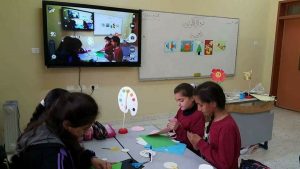
To keep abreast of technological developments and the role of technology in promoting the learning process, the MoEHE has implemented Learning Digitization, an educational program that focuses on incorporating technology into learning. This program aims to enhance students’ learning through the use of ICT in a way that is consistent with the learners’ needs and interests. Initially and in cooperation with the municipalities, it has been applied to a pilot group of 103 schools and provided 12,500 students from the fifth and sixth grades with tablets that contain digital books, learning activities, and educational games. What is more, 5,000 teachers and all school principals in the pilot group have been trained, and the schools have been provided with interactive LCDs and 103 wireless network systems. The aim is to study the added value of using these devices in education as supportive learning tools, where tablets can be substitutes for the textbook and a tool upon which student learning and communication between the teacher and the student are centered.
Educational supervision has enabled teachers to gain access to modern educational research and studies and to develop and advance professionally. In turn, the teachers’ enhanced performance has positively affected students’ achievement, classroom engagement, motivation to learn, and readiness to participate in school activities.
An example of this program is Al-Awda School in Bethlehem District implemented by the principal, Suha Awwad, and her distinguished staff.
Corresponding to the needs of the labor market and aiming to reduce unemployment, the MoEHE is integrating vocational and technical education into the public education sector, particularly for grades 7 to 9, and in both theoretical and practical aspects. In their classrooms, students are exposed to some basic skills in a range of careers, and visits to vocational schools are arranged to offer youth the possibility to continue their education following high school and be introduced to an alternative route to university. Moreover, students are trained in some relevant professions such as electrical wiring, carpentry, paint, preparation and serving of food, clothes design and tailoring, construction work in plastics and metals, interior design and decoration, electricity and home electronics, and cosmetics and food processing.
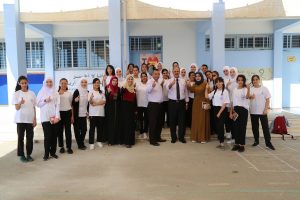
Since the vocational training program has been implemented in 150 schools throughout all districts, the benefits have become obvious, and teachers and students have created innovative and purposeful exhibitions in several districts. For example, Silet al-Thahr Secondary School in Qabatiya District organized exhibitions where students displayed their products that included many artworks, handicrafts, paintings, and drawings, showcasing their creativity and ambition to lead a decent life full of hope and optimism. The program thus provides guidance for students regarding their future professional and academic orientation, thereby enhancing their opportunities to join vocational education according to the needs of the labor market.
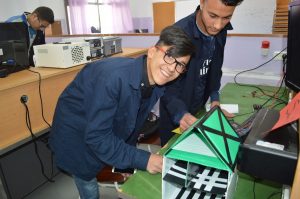
The Ministry, moreover, has been keen to integrate students into different programs, regardless of their abilities. For example, Bint al-Azwar School’s teachers and principal, Majda Alfar, have opened a vocational class that includes students with learning difficulties, students of the ataafi (remedial education) program, and distinguished students who have the desire to join the class. All this has been built on the premise that each student possesses creative ideas and abilities that qualify her or him to be productive and active in the community. The program targets students in grades 7 to 9 and focuses on life skills, vocational education, and social skills. As a result of the implementation of this project and others in this school, many improved learning outcomes have emerged that include positive behavior such as teamwork, responsibility, respect, and commitment; greater ability for self-expression; and the ability to think about future economic self-support.
In line with the ongoing trend towards the use of clean energy, schools have employed technology to manufacture solar-powered bags and the installation of batteries and solar cells. Students are taught the installation principles so that they may complete their studies in this area and enter the labor market. These classes are also expected to market school products whose revenues will be used for development purposes.
The development and success of the education sector could not happen without a solid, comprehensive vision and a system of inspiring educational supervision that takes the initiative to apply the innovative educational ideas and provide teachers with the necessary environment that enhances their roles and enables them to display their creativity and excellence. A good example of such an experience is Wafaa Zabadi who works as an educational developmental leadership supervisor in line with the directives of MoEHE. This supervision, Wafaa asserts, addresses the individual’s strengths and challenges, and it helps teachers to develop their abilities and skills. Among the activities that have positively impacted her teachers are workshops on how to design and implement effective learning activities and achievement portfolios for both teachers and students, as well as the identification of active learning strategies for elementary school classes, modern literacy components, and reading comprehension and storytelling activities. Engagement in this work has strengthened the relationship between the school and the community, particularly with the students’ mothers, as workshops and meetings were held between parents and the developmental supervisors in partnership with teachers and the school administration. Topics of consultations include the level of student achievement, student behavior, familiarization with the Palestinian curricula, and the production of visual aids and learning resources, as well as suggestions for ways to improve general literacy and how to help students who displayed low achievement levels in reading skills.
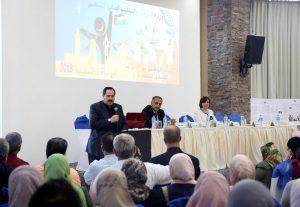
Supervision has helped teachers adopt an approach that is based on active learning and on the utilization of teaching aids, games, and competitions. Experiences and successes have been disseminated through social network sites; professional learning communities among teachers have been formed, and brochures and leaflets were published; the Literacy Fluency and the My Mother Reads Me a Story initiatives are being promoted as examples of literacy programs; and educational games for Arabic language skills and mathematics as well as art and storytelling activities have been shared and utilized. Exhibitions have displayed the achievements of teachers and students.
The MoEHE has also made efforts to ensure that all students in all areas enjoy good health and living conditions. Therefore, it has established Al-Esrar (insistence) schools that focus on providing education for students who are ill. For example, cancer and kidney patients are provided with safe learning opportunities in the Palestinian public and private hospitals in order to ensure the right of each and every student to receive quality education and adequate care. Student patients are therefore able to access their right to education while being hospitalized in hospital schools that are available at Al-Esrar School 1 in Al-Mutala’ Hospital, Al-Esrar School 2 in Al-Maqassed Hospital, An-Najah Hospital Medical Complex, Beit Jala Hospital, and in many others.
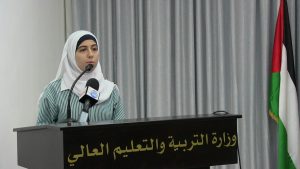
Moreover, MoEHE has guaranteed that students receive their education in Atahdi (challenge) schools that are available in marginalized, remote areas and on the sites of direct contact with the Israeli occupation army. In doing so, the MoEHE aims to strengthen the resoluteness of people, allowing them to remain on their land while providing their school-aged children with the opportunity to learn just like their peers in other regions. Among the outstanding experiences in this area is the Atahdi School 6 in Badiat Ramallah Basic Coed school, located in the Wadi al-Sik area near Jericho, east of the village Deir Dibwan, that caters to the Bedouin communities in the region and where 82 children are enrolled in grades 1 to 6. Even though the school faces a great number of threats and challenges, principal Zahia Arar and the school’s teachers are managing to overcome student safety-related issues by coordinating with a lawyer who has been hired to defend the school in the Israeli courts and prepare reports that show the need to run this school. Zahia also succeeded in improving students’ academic achievement and reducing the drop-out and truancy levels. In addition, she worked with her team to beautify the learning environment at the school through communication with many institutions. To reduce violence at the school, she encouraged teachers to use sports, engage in recreational activities, and hold educational games at the school. Also, she held a competition called Polite and Clean Student, improved the hygiene conditions at the school, and found ways to circumvent the obstacle of the enrollment age for those who are older than the legal age for students. To meet that end, two classes were opened: one was for literacy, and the other for parallel education. All these measures have led to improvement in the students’ academic achievement and in their performance. As a direct consequence, the high achievers of this category of students were honored in recognition of their academic progress.
The MoEHE’s efforts to keep abreast of modern trends in education, support initiatives and create opportunities for innovative experiences to take hold, and provide means to participate in Arab and international forums have been conducive to winning advanced positions in many competitions and receiving many awards. Tala’e Alamal School, for example, ranked first in the Top School Arab Prize for Distinguished Schools in 2016, which was held in Dubai as part of the Reading Challenge. The student Afaf Al Shareef from Araba School in Jenin won first prize in the Reading Challenge in 2017. Kamal Jumblatt Girls’ School in Nablus came in second in the TechnoVision contest 2018 and ranked first in the Belgian project Electronic Learning Development Competition in 2016.
The enormous challenges and formidable obstacles notwithstanding, MoEHE emphatically stresses the importance of continually developing teachers’ competencies and raising their status at the national, regional, and global levels in order to have a bright future, where our national identity is strengthened, investment in education is achieved, and comprehensive, sustainable development steers our path to liberation.

